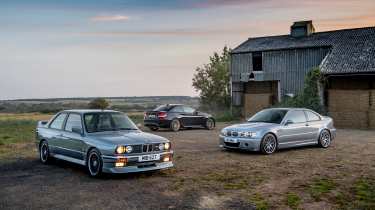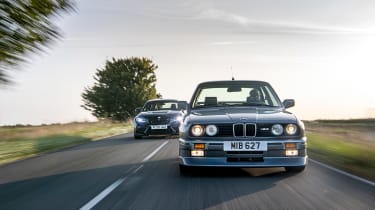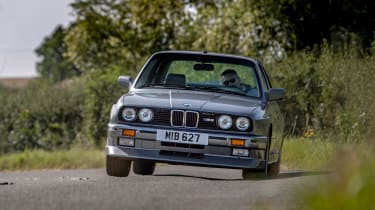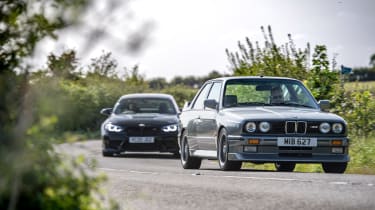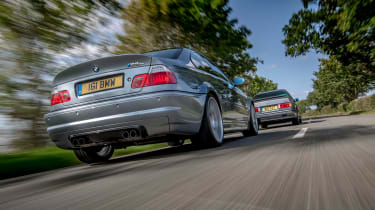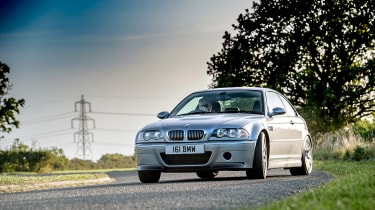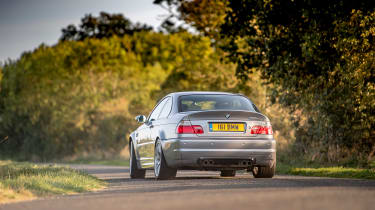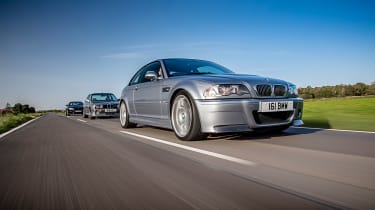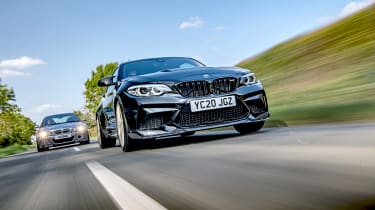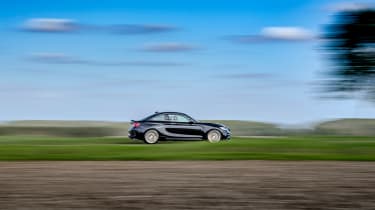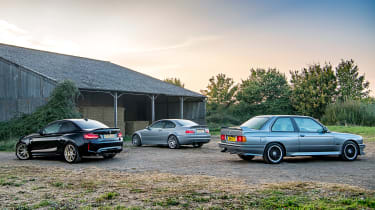BMW E30 M3 v E46 M3 CSL v F87 M2 CS – two-door M Division icons through the generations
BMW’s M2 CS was hailed as a return to form for the M division, but how does it stack up against its purebred predecessors?
Your passenger won’t get why the E30 BMW M3 is so revered. There’s nothing ‘wow’ about the light grey interior and initially not much excitement in the engine department, the in-line four at first offering modest urge and sounding plain and a bit tappety. The ride is soft and a little bumpy, especially if you’re the driver, sitting on the left, on the rougher edge of the road.
If I’m honest, I too am struggling to see the magic in the original M3, even though this is one of the most potent, being a late-model Ravaglia limited edition, based on the Evolution II E30. That still means only 212bhp and, quite frankly, so far there’s little sign of that.
Yet even in the company of the E46 M3 CSL and the much-lauded M2 CS, it still looks fantastic. You have to wonder why nobody makes cars with proper box ’arches anymore. On reflection, it’s probably because no one makes boxy cars like the E30, Delta Integrale and, er, Vauxhall Nova, anymore.
I’m grateful to cross paths with iconic cars such as the E30 M3 every seven or eight years. The M3 never changes but my impression of it is changed by context, newer and newer cars making it look ever smaller and narrower, more upright and under-wheeled. Metaphorically they’ve given it greying temples and laughter lines, but overall it still looks trim and healthy.
More reviews
Group tests
- Alpine A290 v Alpine A110 – how much DNA do they really share?
- Ariel Atom 4R v Caterham Seven ‘evo25’: power-to-weight heroes go head-to-head
- Aston Martin Vantage vs Audi R8 V10 RWD – back to basics
- Caterham Super Seven 600 v Super Seven 2000
- Levante v T1
- Corvette Stingray v Porsche Cayman GTS v Audi R8 RWD
- Great Ferrari hypercars driven: 288 GTO, F40, F50 and Enzo head-to-head
- Lamborghini Aventador Ultimae v Lamborghini Countach
- Lotus Emira v Morgan Plus Four – four-cylinder Brits go head-to-head
- Toyota GR86 v BBR Mazda MX-5: supercharged drop-top battles sports coupe
In-depth reviews
- Abarth 600e 2025 review – Italy gives the Alpine A290 something to worry about
- Alpine A110 review – distinctive, lightweight and unforgettable to drive
- Audi RS7 Sportback Performance review
- Bentley Continental R Mulliner: review, history and specs
- BMW 5-series review – is this still Munich’s anchor model?
- BMW 1-series review – Munich’s Audi A3 rival gains focus
Long term tests
- Abarth 695C Turismo Fast Fleet test – 10,000 miles in the Italian hot hatch
- Alfa Romeo Giulia Veloce Fast Fleet test – 7000 miles in the sharp Italian saloon
- Alpina B10: end of term report
- Alpina B10
- Ford Mustang GT
- Ford Mustang GT
- Ford Mustang GT
- Land Rover Defender 110 Fast Fleet test – 9000 miles in the go-anywhere SUV
- Maserati Ghibli Trofeo Fast Fleet test – 4000 miles in the Ferrari-powered saloon
- Mitsubishi Evo MR 340
Review
- New Aston Martin DBS 770 Ultimate review – 759bhp super-GT driven
- New Bentley Batur 2023 review – can it possibly be worth £1.65m?
- 2023 Chevrolet Corvette C8 Z06 review – the American 911 GT3?
- Kia EV6 GT-Line S prototype review – the EV that shows how it’s done
- BBR Supercharged Mazda MX-5 (ND) 2023 review – tuned 250bhp roadster driven
- MG4 Trophy 2023 review
Reviews
- Abarth 695 75 Anniversario edition 2024 review – a fitting send-off for Abarth’s hot supermini?
- Abarth 500e 2023 review
- AC Cobra 378 Superblower MkIV 2021 review – another V8 Cobra, but with a GM heart this time
- Acura Integra Type S 2024 review – a Honda Civic Type R with added restraint
- Alfa Romeo Giulia 2025 review – get one while you still can
- Alfa Romeo SZ: history, review and specs of an icon
- Alfa Romeo 1750 TBi
- Alpina B3 GT Touring 2025 review – a 190mph alternative to the BMW M3 Touring
Inside, it’s basic in a way that even the cheapest new car today isn’t. You unlock it by twisting a key in the door lock, there’s no steering wheel adjustment, no radio and no air con. The trip computer looks like a simple calculator, but at least there’s a decent three-spoke wheel and the flat door cards and sports seats are partly trimmed in M-colour flecked cloth. Basic means light, of course, and lightness is a key weapon of the E30 M3.
Where’s the magic, though? Where’s the character and ability that earned it a place in the evo Hall of Fame alongside those other rare driver’s cars whose ability is impervious to the ageing process, that can still show the new heroes a thing or two? Cars such as the original Lotus Elan, the 968 Club Sport and the Clio Williams, cars which are unfailingly absorbing and rewarding.
Our M-car convoy has been bottled up behind slow traffic but now we are released. The pace quickens and the road starts to twist and then, literally in one corner, the E30 reveals its class. It’s a quick, long right-hander and from the moment I steer the M3 in, it feels brilliant. It comes out of nowhere; the steering felt low-geared and heavy initially and had an unpromising softness on-centre, but the moment the E30 is committed to a corner it snaps into sharp focus. The balance, the grip and the calm poise are extraordinary. It carves through the turn with an ease that makes me laugh out loud. Why did I ever doubt the E30?
Up the pace and you discover a huge amount of untapped performance too. As the revs climb, so does the urge from the 2.3-litre slant-four, with 5000rpm the watershed. There’s a proper kick here, the engine’s note becoming purer and keener as it gets the better of the car’s mass, and from there to the 7000rpm red line the power escalates thrillingly. It feels potent and unburstable.
Altogether, it’s properly fast. Editor Gallagher is behind in the M2 CS and I reckon the new car will have trouble staying with the E30 through some of the twists coming up. I reckon anything would. The M2 has almost 450bhp and Michelin Cup 2s but it’s also much wider and weighs a whole chunk more: 1550kg versus 1165.
I’ve driven many cars along this road and this E30 is one of the best. At a tricky, cresting right-hander it turns in so effectively that I slightly cut the corner because I’ve under-estimated the front grip from its plain Conti SportContact 2s. A tight left-right-left sequence follows and the way the M3 whips through it is astonishing. It feels incredibly grippy and perfectly balanced and pops out of the other end like a cork. There’s no understeer or oversteer to be corrected, no chassis winding-up to be unwound; the car finds the straight with the same calm it tackled the corners. How much faster could it go through there? Quite a bit, it turns out. Eventually, you can just start to hear the front tyres scrub, so you get momentum and full power to push the tail a smidge wide over the exit camber. Wow.
This M3 is more than the sum of its parts, but that’s faint praise because it’s not this way by accident: it’s exactly what BMW Motorsport GmbH set out to achieve. Its primary objective was to create a car to dominate touring car racing, and it succeeded spectacularly, but it also poured a lot of effort into the 5000 road cars built for homologation and succeeded in creating one of the great road cars too, which is how BMW sold over 17,000.
It took BMW a while to find the formula again. The E36 M3 that replaced the E30 in late ’92 didn’t cut it for a number of reasons, perhaps chief among them being that it wasn’t conceived and designed explicitly with motorsport in mind. It did, however, come with a potent and characterful six-cylinder engine and was a huge hit, selling around three times as many as the E30 M3. It also had some successes in motorsport, but it wasn’t as keen a driver’s car. For the E30 M3’s spiritual successor we had to wait until 2000 for the E46 M3… and then wait another three years for the CSL.
What a great-looking car. The CSL exudes confidence. Black or silver were the only options and silver shows off the carbonfibre add-ons, including the front ‘flippers’ and novel carbonfibre roof. With its subtly enlarged arches, gently kicked-up boot spoiler and superb stance it is, for me, the most handsome M3 of all. It has probably the best-looking alloy wheels ever to grace a road car too, and the single round air scoop in the front bumper/apron is a simple but effective identifier, like the bonnet ‘nostril’ of the Toyota Celica GT-Four.
Hopping from the sparse cockpit of the E30 into the much more stylish but similarly sparse interior of the E46 (a radio and air conditioning were options) is a massive shift. The E30 felt tall and narrow, with its upright screen and thin pillars, but you drop low into the fixed-back bucket of the wider E46 and it feels like the window line is much higher.
What an engine. The M Sport straight-six was a great engine in the stock M3, especially in 3.2-litre, 338bhp form, with a fantastic reach and an abundance of aural character. Snick it into fourth at tickover, floor it, and the sound is epic and orchestral, evolving right the way to 8000rpm. The CSL upped the stakes with a carbon air intake, a huge mouth and a butterfly valve the size of a grapefruit, plus a thin-walled exhaust system for an even grittier, angrier and more penetrating engine note, and an extra 17bhp.
The CSL has so much more urge than the E30 and howls along with real purpose… but after the original M3 it feels big and heavy and there’s an unexpected lack of connection with the car. Feedback from the power steering is less detailed and the weighting a fraction light given the crispness of response. However, what I feel more keenly is the reduced connection because of the SMG gearbox – and this automated single-clutch manual elicits thumps from the rear on full-throttle upshifts. The CSL is also a reminder that it took BMW far too long to get round to equipping its high-performance cars with decent brakes. The first time I hit this CSL’s middle pedal there’s a shimmy through the steering wheel and a rumble from the front. Oh dear. We’re not off to a great start.
> BMW returning to Le Mans in 2024
The CSL wasn’t received with universal praise when it was launched. For an extra £20k you got that additional 17bhp, which seemed a bit mean, and saddling a car as sharp and focused as the CSL with the SMG ’box seemed almost perverse. On top of this was the Michelin Cup tyre scenario: owners wanting these sticky tyres had to sign a disclaimer accepting they would be considerably less effective in the wet and cold.
I think we need to start again. Photographer Andy Morgan gets busy with detail shots and group statics and it’s a good while before I drop into the embrace of the CSL’s Alcantara-trimmed bucket seat again. It’s an undeniably special place to be. The bespoke, glossy carbon door casings and metal pulls displace the mirror switches to the bespoke carbon centre console that also wears a little chrome plaque declaring that this is one of just 422 UK CSLs.
Twist the key, knock the gearlever across to find neutral (0) and twist the key again. The straight-six sounds raw and menacing, loud and edgy. Select first and let the auto function take the strain for a while and get a feel for the CSL. It may only have gained 17bhp but it sounds like 50, and it feels like it too, partly because BMW’s engineers managed to trim a massive 110kg from the stock M3, bringing the CSL in under 1400kg. Not that our performance figures bore this out at the time.
Initially the fixed bucket feels a fraction too upright and the steering a tad heavy, but once we’re rowing along they both seem fine, and even the SMG is doing a decent job in auto. I still reckon the stumpy, oddly padded lever looks like the handle of a kitchen tool for juicing limes, but once you’ve told yourself you need to finesse the upshifts if you go manual with the lever or paddles, things are a lot less frustrating and a lot smoother.
The CSL has a weighty feel but you can also appreciate the tautness of the set-up, which is just the right side of abrupt and promises control and precision even at the limit. The steering is still a fraction lighter than I’d like at speed, or perhaps the response is a little too keen off-centre, but once you start to load the chassis, the CSL finds another level. It feels seriously composed and capable and grippy. And don’t forget the little Sport button down on the centre console. It seems a ludicrous addition on a car that’s as raw and fierce-sounding as this, but it really does step up the throttle response and urgency. And the noise.
Given the relentless advance in tyre performance, the Michelin Pilot Sport 4 Ss adorning this CSL are probably as grippy as the original Cups in the dry as well as being fantastic in the wet. Commit the CSL to a testing corner and, just like the E30, it feels like it has hit its sweet spot. There’s immense grip, the front dives in slip-free, but equally the rear is unwilling to give up its grip. It’s accelerating terrifically hard when it does go, yet it maintains its composure, the angle slight, the recovery neat and easy. Such poise speaks of a great depth of ability and many hours of development. It’s something we often admire in Porsches, although remembering the CSL on Cup tyres, I reckon these modern Michelins add more than a bit of polish to the CSL’s performance.
There ought to be another M3 up next, but seeing the M2 together with the CSL it’s hard to argue that the CS isn’t a natural to be next in this sequence. It’s a similar size to the CSL, its curvy, gloss black bodywork apparently swollen around the wider wheel tracks and deep alloys. I wasn’t sure about their pale gold colour at first but I’ve quickly warmed to it, and oh boy, does the CS look pumped.
Closer inspection reveals that the CS and CSL are on almost identical-size tyres, but there’s something very different sitting behind the slender spokes of the CS’s lightweight alloys: huge carbon discs. They look as big as the E30’s rims and are a £6250 option. Standard carbonfibre kit includes the roof and bonnet (a work of art), front splitter, door mirrors, rear spoiler and diffuser. Yet the mega-M2 weighs a rather chunky 1550kg…
Peer in through the many vents cut into the nose of the M2 and you’ll see where some of the mass comes from, it being wall-to-wall radiators. The M2 uses a version of the M3/4’s twin-turbo in-line six that’s good for a memorable 444bhp. This 3-litre six blows the earlier cars away in terms of torque too, with over 400lb ft from just 2350rpm (the CSL delivers 273lb ft at almost 5000rpm), and thus promises a much different driving experience.
Unexpectedly, inside there is one very obvious link with the E30 M3: a manual gearlever. The old E30’s might be a dog-leg-first five-speeder but the lever of the M2’s six-speed looks just the same and it turns out even feels the same, with a light, direct, knuckly action that makes it good to use. The 25kg weight saving over the dual-clutch transmission is somewhat offset by the lovely, cutaway bucket seats being electrically adjusted, though.
There are two elements of these cars that sum up the experiences you can expect, the first being the ignition keys, the E30’s being slim and simple, the CSL’s growing in size (to accommodate the buttons for the remote locks) and the M2’s a chunky fob (with a hidden blade). The second is the steering wheels, more specifically the diameter of the rim. It’s thin in the unassisted E30, slightly thicker on the assisted CSL, but properly fat on the CS, to no obvious benefit.
In the M2, your passenger will get a very strong sense of at least one aspect of its abilities the moment after you put your foot down. The CS is very potent and very fast. In fact, having worked to get under the skin of the E30 and to discover the CSL’s ability, my first thought after a full-on punt in the CS was whether it would ever be wise to turn off the stability control and find the car’s limit, even on a warm, dry road.
It’s not all about the power, though. One of the most enjoyable aspects of the CS is that it sounds like it has a proper, gutsy, naturally aspirated straight-six. Not as raucous and visceral as the CSL’s (what is?) but blessed with a character-laden drawl, and it’s coupled to a great manual shift that allows you to access the performance – and sound – in the way you want. There is also general tailoring, of course, with three-position throttle, steering and damper settings. Sport/Comfort/Comfort is my preferred compromise on these roads, with the middle of those three choices ensuring the manageability of the steering – because you will always come back to that power.
It’s more exploitable than you might expect because the delivery is impressively lag-free and progressive for a turbocharged engine, but where the M3s took some provoking to step out, the M2 is as easy as you’d expect with so much ready torque. The trick is only getting as much as you want, and while it’s not as snappy as some turbocharged cars, you still have to be fast and accurate with opposite lock and confident if you want to ride out the gear.
Which would I take, money no object? Actually, money isn’t a factor, because decent E30 M3s and CSL M3s currently go for upwards of £80-100k, and the M2 CS is still at about £75k (unchanged from its as-new price), so it’s all down to driver satisfaction and overall appeal. The M2 is a great-looking thing, the natural, 2020 successor to the iconic M3s here, in scale and style. It’s the most convincing of all the previous-generation M3/M4 derivatives I’ve tried with the turbocharged straight-six too. However, in this company its performance is not as balanced and cohesive a part of the package as it is in the classic M3s.
There’s a real edge to the handsome CSL, an alluring grittiness that permeates almost every aspect, from the raw, gravelly voiced straight-six to the ride that sits, beautifully, just the right side of tough. The CSL brims with character and its six is properly potent too, with a thrilling top end. It’s a car I appreciate more now than then, and as the saying goes, quality is remembered long after the price is forgotten. The CSL is a thoroughly engineered and focused M-car, an M3 with all the fat taken out. If you can come to terms with the SMG gearbox and put up with the rumbly brakes, it’s damn near irresistible.
Me? I still can’t. Or is it that I still can’t resist the E30 M3, a four-cylinder car with just 212bhp and modest tyres, fixed dampers and unassisted steering? Of course, lack of mass helps too. It’s quick enough, but it truly becomes the car it was designed to be in the corners, where its grip, poise and balance are breathtaking, and at readily exploited speeds. The original M3 truly is one of the all-time greats.
Specs
| BMW M3 (E30) | BMW M3 CSL (E46) | BMW M2 CS (F87) | |
| Engine | In-line 4-cyl, 2302cc | In-line 6-cyl, 3246cc | In-line 6-cyl, 2979cc, twin-turbo |
| Power | 212bhp @ 6750rpm | 355bhp @ 7900rpm | 444bhp @ 6250rpm |
| Torque | 170lb ft @ 4600rpm | 273lb ft @ 4900rpm | 406lb ft @ 2350-5500rpm |
| Weight | 1165kg | 1385kg | 1550kg |
| Power-to-weight | 185bhp/ton | 260bhp/ton | 291bhp/ton |
| 0-62mph | 6.7sec | 4.9sec | 4.2sec |
| Top speed | 147mph | 155mph (limited) | 174mph (limited) |
| Price new | £22,750 (1987) | £64,451 (2003) | £75,355 (2020) |
| Value now | £65,000-150,000 | £80,000-110,000 | £75,000 |
| evo rating | 5 | 5 | 5 |
This BMW triple-test was first published in evo 279. To purchase any back issues, or subscribe to our monthly print magazine, click here to see our latest offers.

